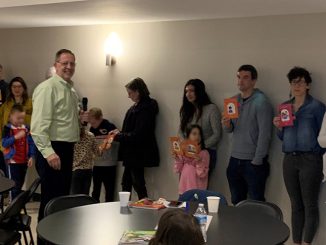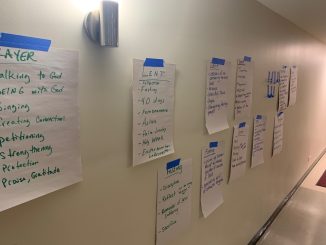
We human beings tend to be resistant to change. Our brains are wired in such a way as to take the path of least resistance, which means that the brain likes to develop habits and routines and stick with them. The longer we’ve been practicing a certain habit or behavior, the more difficult it is for the brain to change.
When it comes to children’s faith formation, we have developed some practices and habits over many decades—and not all of them are good habits. Most notably, we have conditioned parents to act as chauffeurs, dropping off their kids at religious education so that the parish can teach the faith while the parents go shopping, get a cup of coffee, or take a much-needed nap. That is not a criticism of parents—I would do the same thing! The problem is, this drop-off mentality no longer works in today’s world the way it did when Catholics lived in more sheltered, homogeneous, and insular communities. It is for this reason that many parishes are searching for alternative models for catechesis, not the least of which is family catechesis, which I have posted about here previously and highly advocate.
Before you move too quickly in making changes, however, keep in mind what I said above about humans not being receptive to change. We have spent decades reinforcing behaviors around children’s faith formation that ask little of the parents. To suddenly shift to a new model that puts most of the responsibility on the parents will cause whiplash! So, while I advocate for this model, I urge you to proceed with caution.
At St. Andrew Parish, where this model was piloted with Loyola Press Family Catechesis, the catechetical leader, David Heimann, and his pastor, Fr. Sergio Romo, took this cautious approach:
- While they continued with their traditional program, they began informing parents that they were seeking to switch to a new model. They held meetings and provided literature explaining the thinking behind the family catechesis model and began answering questions.
- In February and March of that same year, they ran a pilot of the new model, setting aside the traditional format and going with the new format for two months, providing more support and soliciting feedback.
- After the pilot months, they did an official feedback and evaluation process and came to the conclusion that there was sufficient support to move forward.
- They provided information about neighboring parishes with the more traditional format, knowing that some people would not want to shift to the new family model. Parish leaders did not want them to leave the Church but invited them to find another parish in those cases. (They expected a 10% hit in enrollment that never materialized.)
- Over the summer, they continued to prepare parents for the new model.
- In the fall of the following year, they implemented the new format with a kick-off meeting that once again reviewed all of the thinking behind a family catechesis format and reassurance to parents that they would indeed be capable of assuming this role with their children.
Because of their cautious approach, they ended up not only not losing enrollment, but increasing by 10%, because word got out that they were doing something unique and thoughtful.
If you are considering moving to a family catechesis model, by all means, do so, but take the time to prepare your parents and help them to open up to the new habit of truly becoming their child’s primary educators in the faith.





I am a catechist in parishes that both use the current “drop-off model” of catechesis. I am searching for a way, using my class’ current textbook (Loyola First Reconciliation and First Eucharist) as a bridge toward more family catechesis. Has anyone tried this or does anyone have any suggestions? At this point in the last month, using the reasoning of lost classes due to snow days, I have been asking the parents to read over the chapters at home WITH THEIR CHILDREN and supervise them in doing the activity pages in the chapters. Is there more specific direction I should be givign the parents? I have had mixed success as you can imagine with the children with the least faith formation at home being the ones whose parents have not done this. Almost no parishes in our archdiocese have adopted the family catechesis model.
We are in our 3rd year of family catechesis. Parents have class during the time students do and we meet bimonthly.. Our drawback is the same though. Continuing the catechesis at home with all the other time consuming activities families get into usually leaves very little effort by them. We also have grandparents who bring their grandchildren because the parents don’t want to be bothered as well as shared time between homes with parents who are divorced or separated. It’s been challenging for us too and I am hoping over time they begin to accept some of the catechesis because as we know the future then of the youth becomes less promising to continue in the faith as they mature. I am hoping for a better acceptance in this but it will take time and some spiritual awakening.
So well said, Paula. This is indeed challenging, but I believe it is putting our efforts in the right place: engaging with families as a whole rather than just working with their kids and hoping that the parents pick up a few things along the way. I think this is what the New Evangelization looks and feels like when the rubber hits the road…not so glamorous and very difficult work but definitely “new” in its approach. Thanks for sharing.
Last year, my Pastor and I felt that the parents needed to be formed, before asking them to form their children. So, they came to a class, at the same time as their children once a month. As it turned out, they did not like discussing their faith with one another, so small group time was a challenge. The parents requested to have some class times with their children and participate in a guided lesson with their children. I had the opportunity to try this approach this year, along with childcare, and they loved it. Really hope to do more next year. Childcare is a challenge, but definitely needed.
Thanks for sharing your experience Judy. It is fascinating to see how folks react in different locations. In some places, the faith-sharing is their favorite part! The important thing is that you are making adjustments to fit their needs!
I just launched the inter-generational catechesis model this year. It is a challenge but it best reflects what our families need: family based learning of faith. I am wondering if anyone has an evaluation form I could use to assess the program? If they could share it with me at mark@southwindsor.cc
Thanks for sharing your experience, Mark. I wish you the very best of success! When it comes to evaluation, that can be a tricky thing. Some of the evaluation forms that are out there are geared toward evaluating a program that follows the school model. Ultimately, it seems to me, that we need to assess and evaluate what children and parents are learning and incorporating into their lives. A good way to do that is to engage people in the NCEA Information for Growth (IFG) and Assessment for Children/youth Religious Education (ACRE) is probably one of the best ways to measure this. It would be good to conduct an assessment now and then compare in a few years to see what patterns can be detected. Contact the NCEA for info.